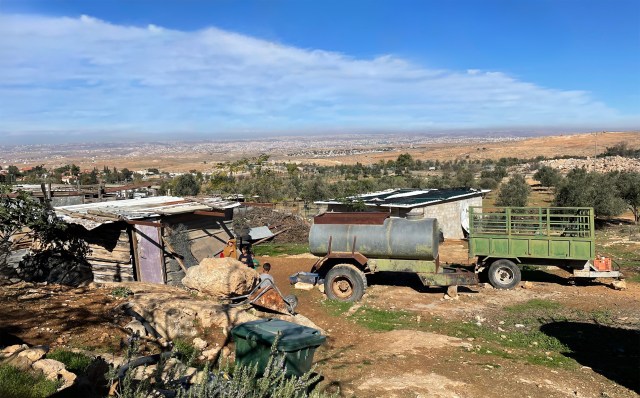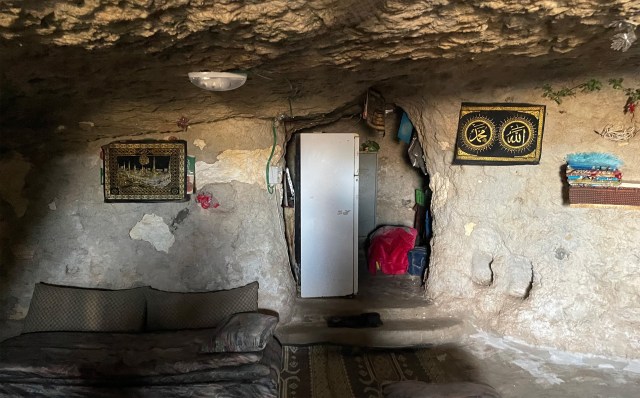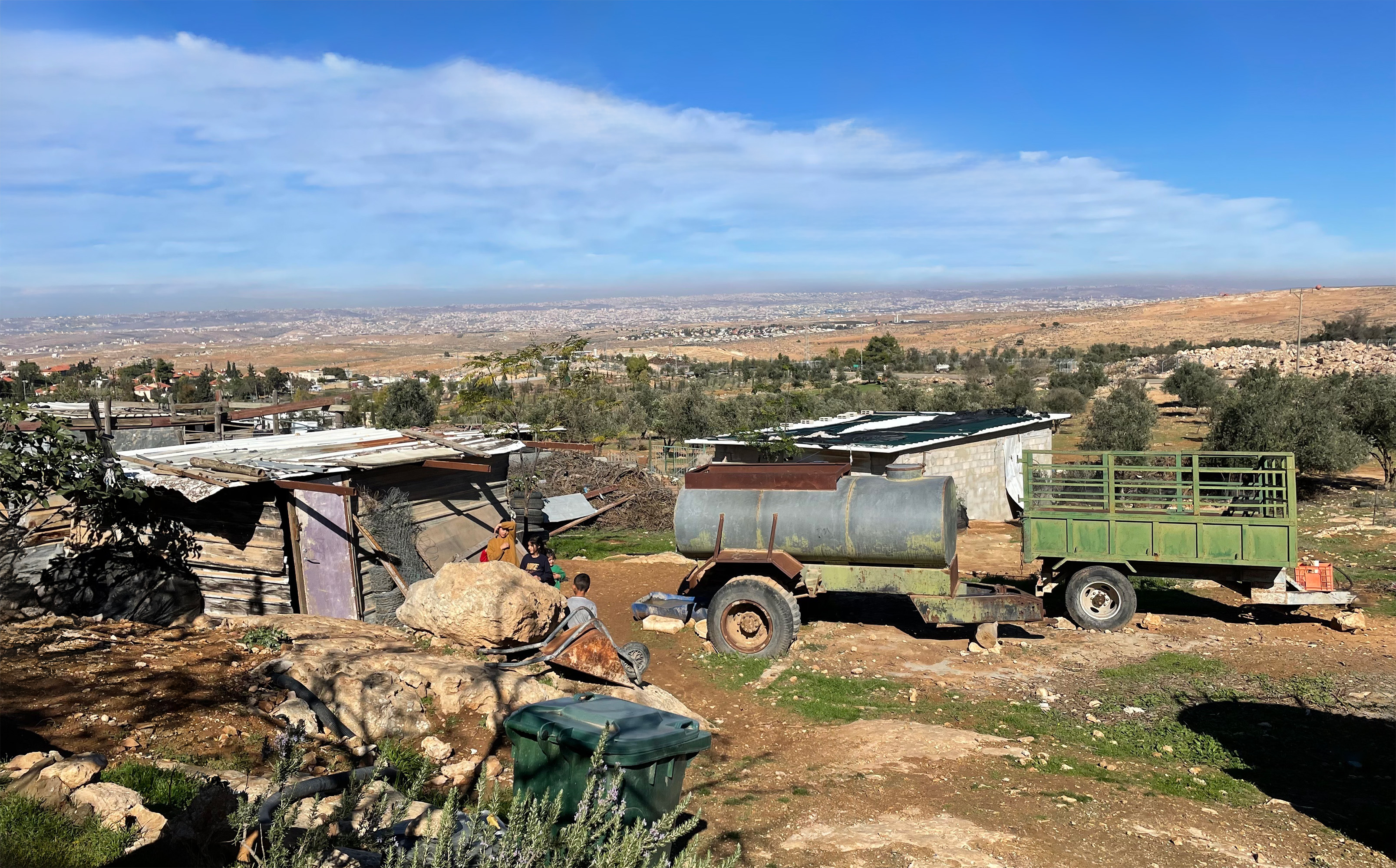Jonathan Pex is concerned about his Palestinian Bedouin neighbors in the West Bank’s South Hebron Hills.
They’re sheepherders who live in an expansive cave outfitted with solar electricity, ten minutes from Pex’s home. The region has seen an uptick in Israeli settler violence against Palestinians since the October 2023 Hamas attacks, and the Palestinian family is afraid they may be next on the settlers’ hit list, as they’ve had several disputes with their neighbors over grazing rights.
So Pex, a Jewish Israeli Christian, packed a small bag and drove from his home near the border of the West Bank to Abu Shchade’s property for an overnight stay in late March. Through a friend’s invitation, he had joined a local night-watch group made up of several dozen Israelis who are on call to help local Palestinians concerned about extremist settler violence.
After a simple dinner of rice with sheep’s milk, sliced tomatoes, and flatbread with olive oil, Pex set up the sleeping mat and blanket the Bedouin women provided and joined two other Israeli “night guards” in a strategic location outside the cave.
“I’m going to do whatever I can to support them,” Pex said. “Jesus would have really had a heart for these people.”
Pex said the attacks often happen at night. During past night watches at the homes of Bedouins, a seminomadic people originally from the Negev desert, he encountered some young men who had sneaked onto their property to cut water pipes and destroy solar panels. Settlers take in troubled youth and send them out to terrorize their Palestinian neighbors, Pex said.
Sometimes the attacks are far worse than property damage.
In late March, dozens of extremist settlers assaulted a group of Palestinians in the village of Jinba, also in the South Hebron Hills. Three of the victims needed medical care, including a 16-year-old Palestinian boy with a severe head injury. Local authorities arrested more than 20 Palestinians but no settlers in the wake of the attack. Pex noted that this was a common trend.
An attack last August involved more than 100 masked settlers who torched houses and cars in the northern West Bank city of Jit and killed a Palestinian man. Israeli prime minister Benjamin Netanyahu condemned the attack but has done little to curb settler violence and stop the expansion of illegal settlements. Israeli human rights groups claim indictments against settlers are rare.
Close to half a million settlers—Israelis with an even split of ultra-Orthodox, secular, and religious nationalist beliefs—live among 3 million Palestinians in the West Bank. After Israel captured the West Bank from Jordan during the 1967 war, it began building Israeli communities among the Palestinian population, an endeavor that has accelerated over time.
The International Court of Justice considers all settlements in the West Bank illegal, but Israel claims its 141 government-sanctioned settlements are necessary for Israel’s national security and legal as they are built on “legitimately acquired land which did not belong to a previous lawful sovereign and which was designated as part of the Jewish State under the League of Nations Mandate,” according to Israel’s Ministry of Foreign Affairs. Most Israelis who move to the settlements believe Israel has a historical or religious claim to the territory.
 Photography by Jill Nelson
Photography by Jill Nelson Photography by Jill Nelson
Photography by Jill NelsonMore than 200 of the settler outposts are considered illegal, even under Israeli law. Some far-right settlers wear partial Israeli military uniforms, posing as ruling authorities and committing acts of violence.
Some extremist settlers want to prevent a future Palestinian state in the territory, so they turn to violence and threats to scare Palestinians away and take over their property. Since the war began, uniformed settlers have increasingly patrolled beyond their settlements and attacked Palestinians. The United Nations counted more than 1,800 settler attacks between October 2023 and the beginning of this year.
The Biden administration in February 2024 imposed sanctions on settlers accused of violence or the destruction of property. (The sanctions also applied to Palestinians who harm their neighbors.) The Trump administration scrapped the sanctions in January.
“[The extremist settlers] have done many bad things in the name of the army and with the equipment of the army,” said Noam Oren, a Jewish Israeli farmer who lives just outside the West Bank. He is also part of the night-watch group, and sometimes Palestinians also call him during the day with reports of trouble.
A year ago, a Bedouin Palestinian called him when settlers brought a herd of sheep to his property to eat from his barley pile, just 50 yards from his home. Oren said settlers also let their sheep drink from Bedouin rainwater tanks, and sometimes they spoil the water by adding oil.
Oren called the police and drove to his friend’s home to confront the settlers—a decision he now acknowledges may not have been wise. As Oren approached the men, he said one threw a rock at his face while another shot his gun in the air. Oren tackled the man who had hit him with a rock and held him down until the other man put his gun down.
When Oren released the settler, the settler began throwing rocks again while the other man made a phone call. Five minutes later, 20 more uniformed settlers came onto the property and tackled him. The police officer eventually arrived and interviewed all parties involved.
 Photography by Jonathan Pex
Photography by Jonathan PexOren showed the officer his injuries and video evidence from his phone that proved the settler had started the fight, but he learned weeks later that the officer still sided with the settlers in his report. “This is how it works,” Oren said.
Oren filed a separate report in the West Bank city of Hebron, and his case is still pending. The settler brought charges against Oren but eventually dropped them after Oren presented his evidence to regional authorities.
Pex said it’s common for settlers to provoke Palestinians, and as soon as a Palestinian loses patience and reacts, the settler calls that person a terrorist and files charges. “Usually it’s just a poor Palestinian herder,” he said. Many Palestinians have added security cameras to their properties so they have a chance at proving their innocence.
Pex is concerned that many of his Israeli friends, even those with left-leaning views, haven’t had compassion for Arabs since the Hamas attacks. But he believes the recent escalation in violence has raised awareness about the lack of justice in parts of the West Bank. He is considering hosting tours in the South Hebron Hills so Israelis who are afraid to visit these areas alone have an opportunity to meet the Bedouin population suffering from these attacks.
“It makes me sad that a lot of Christians support Israel at all costs,” Pex said. He pointed to Jesus’ words in the Beatitudes, “Blessed are the meek,” as instructive for Christian interactions with suffering populations.
Pex didn’t sleep much during his night watch at Abu Shchade’s property—the dogs, chickens, and sheep were noisy—but he’s glad he went. The settlers kept their distance, and he hopes the somewhat regular presence of his group will be a deterrent. In the morning, the family served him fresh eggs, cream cheese, and bread.
“It was really quite an experience,” Pex said. “They’re sweet, simple people who live with hardly any running water, and all of this really breaks my heart.”















